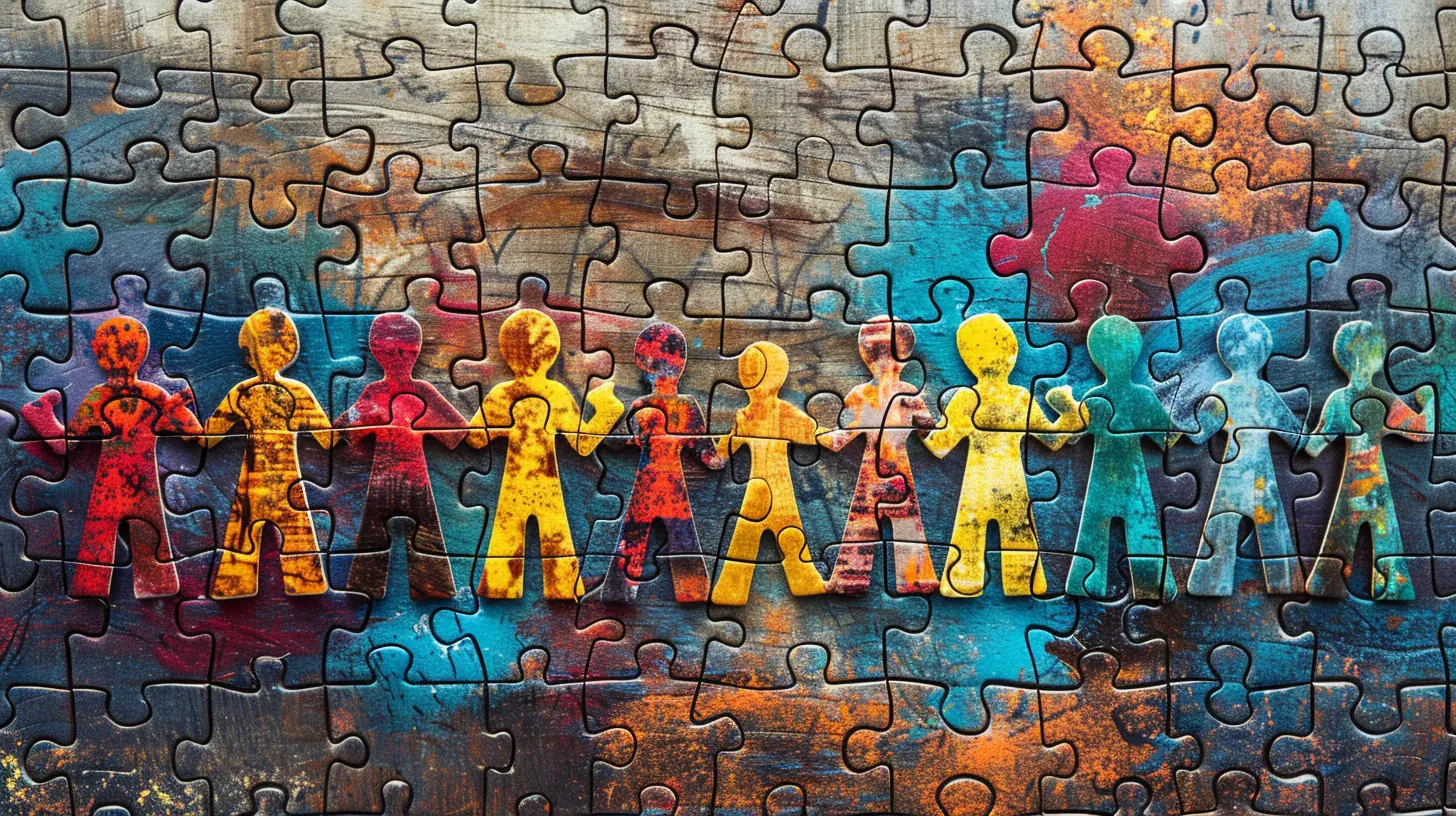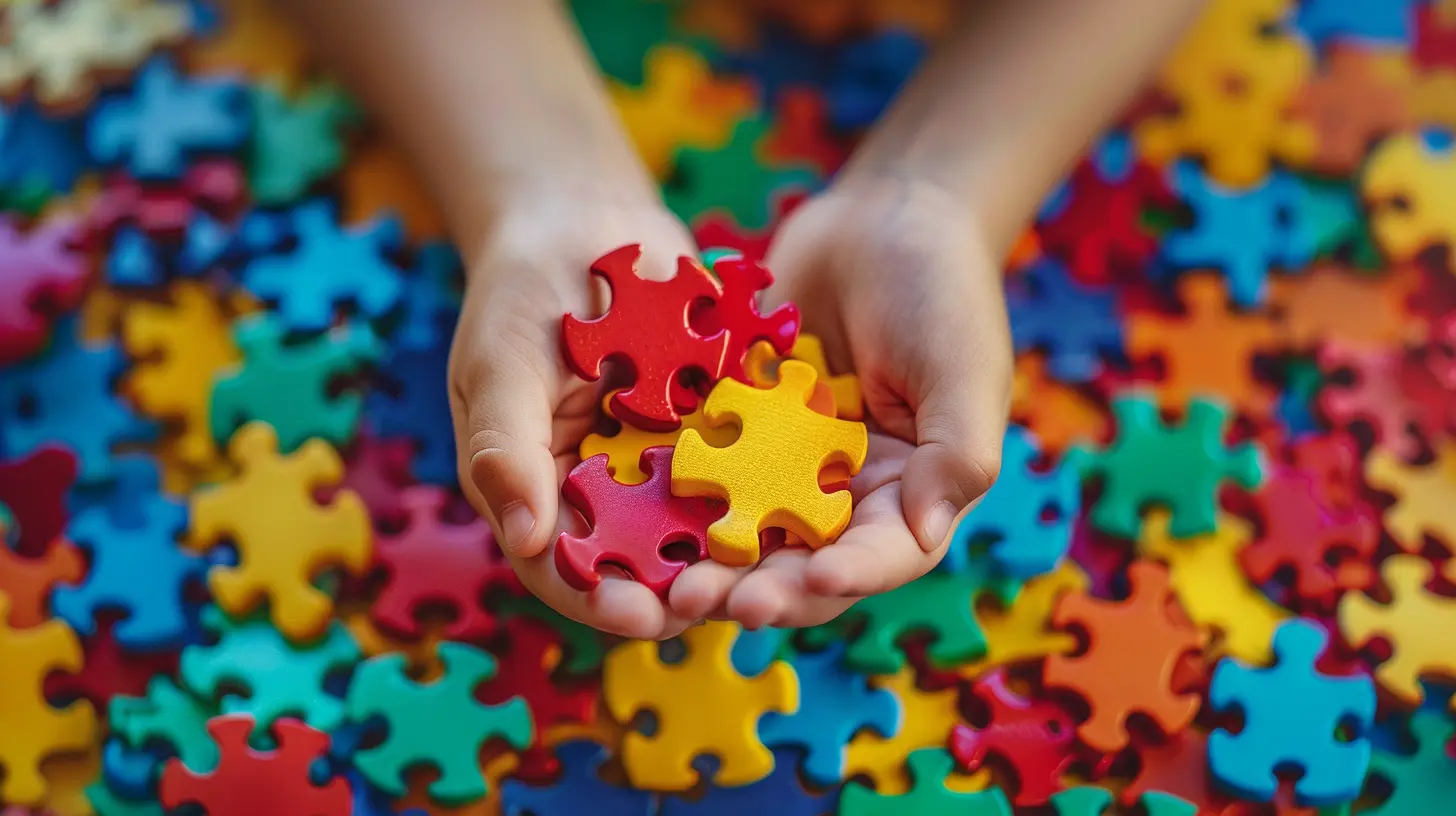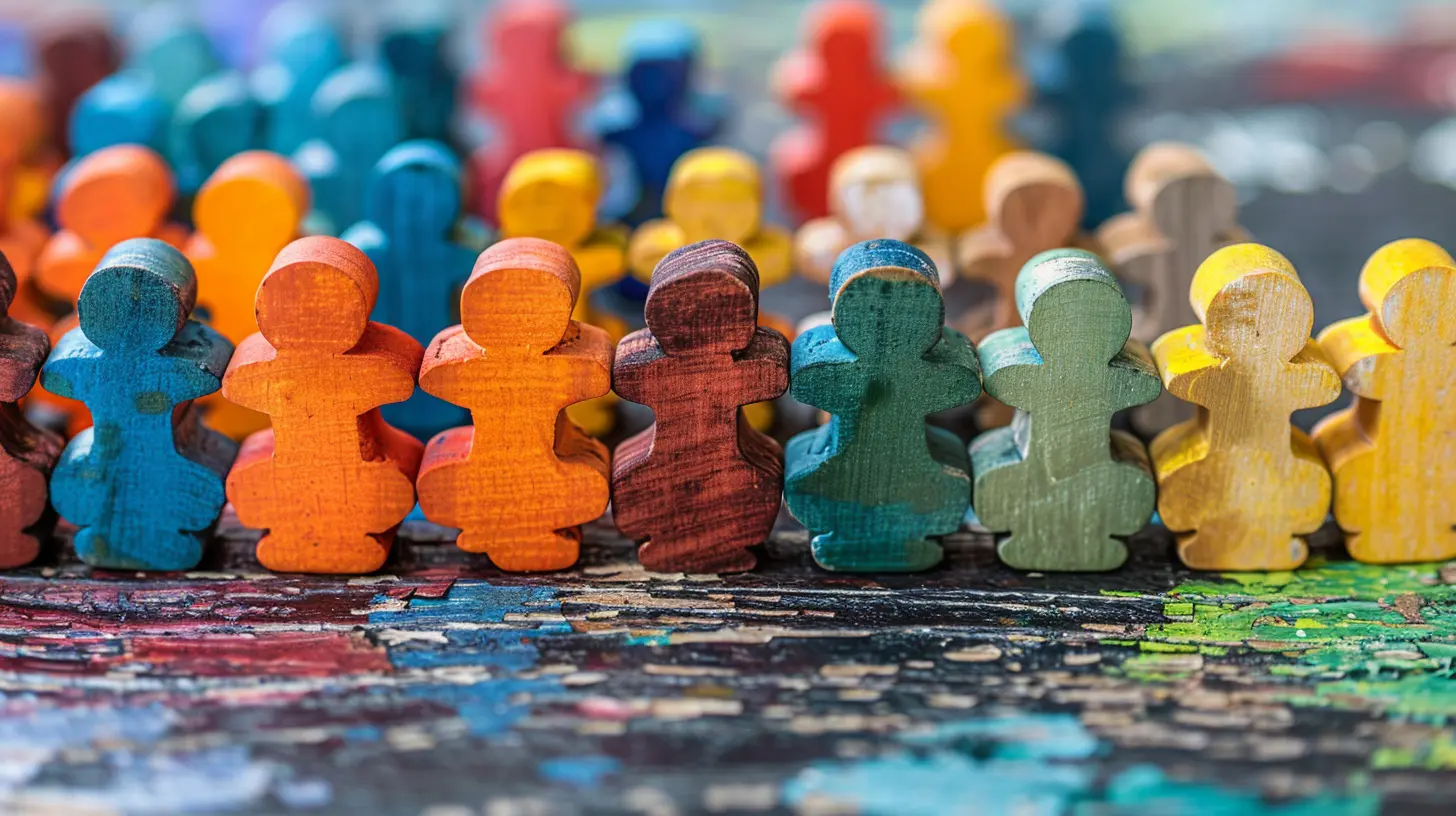Autism and Community: Why Belonging Matters
25 February 2025
Autism is a spectrum condition that affects how individuals perceive the world and interact with others. While autism presents itself differently in each person, one thing holds true across the board: the need for community and belonging. For many on the autism spectrum, social connections can be challenging to navigate. But just because something is difficult doesn't mean it’s any less essential.
In this article, we’re going to explore why belonging matters so much to individuals with autism, how communities can be more inclusive, and the role that support networks play in fostering a sense of belonging for people on the spectrum.

What is Autism?
Before diving into the importance of community, let’s get a basic understanding of what autism is. Autism Spectrum Disorder (ASD) is a developmental condition characterized by differences in communication, behavior, and social interactions. The term "spectrum" is key here because autism presents a wide range of symptoms and abilities. Some individuals with autism may have difficulty speaking, while others may excel in specific intellectual or artistic skills.Autism is not a "one-size-fits-all" diagnosis. Think of the autism spectrum like a rainbow—each color blends into the next, and no two shades are exactly the same. That’s why it's so important to understand and appreciate the diversity within the autism community.
The Role of Community in Human Life
To understand why community is so crucial for individuals with autism, let’s first take a step back and think about the role community plays in all our lives. We, as humans, are social creatures. Whether it’s through friendships, family relationships, workplaces, or online groups, we all have a natural inclination to belong to something bigger than ourselves.Communities provide us with a sense of safety, support, and identity. They validate our experiences, celebrate our victories, and help us through challenges. Now, imagine navigating life without that sense of belonging. It would feel isolating, wouldn’t it? For people with autism, isolation can be an unfortunate reality, especially when their social and communication challenges act as barriers to full inclusion.

Why Belonging Matters for People with Autism
1. Combatting Social Isolation
One of the primary struggles many individuals with autism face is social isolation. This can stem from a variety of factors, including difficulty understanding social cues, sensory sensitivities, or simply not feeling accepted by their peers. It’s no secret that being socially isolated can lead to feelings of loneliness, anxiety, and depression.And here’s the kicker: social isolation isn't just a psychological issue; it can have real physical effects too. Studies have shown that chronic loneliness can be just as harmful to your health as smoking or obesity. For individuals with autism, who may already have heightened stress and anxiety levels, the effects of isolation can be even more pronounced.
Belonging to a community acts as a buffer against these negative outcomes. When people with autism have a place where they feel safe, understood, and valued, it can drastically reduce the feelings of isolation and improve their overall well-being.
2. Building Confidence and Self-Esteem
Think back to a time when you felt like you truly belonged somewhere. Maybe it was a sports team, a club, or even a close-knit group of friends. When you belong, you feel valued, and when you feel valued, your confidence naturally grows. The same principle applies to individuals on the autism spectrum.Communities that foster inclusion and understanding can help build confidence. When individuals with autism are accepted for who they are, without feeling the pressure to conform to neurotypical standards, it empowers them to embrace their own unique strengths and abilities. This can be a game-changer for self-esteem.
3. Opportunities for Social Learning
Social skills don’t come naturally to everyone, and for many individuals with autism, they need to be learned through structured teaching or peer modeling. Belonging to a community provides the perfect environment for social learning. Whether it’s through casual interactions, group activities, or more formal settings like therapy groups, being part of a community helps individuals with autism practice and develop their social skills.It’s like learning to ride a bike—you can read all the manuals you want, but until you actually hop on and start pedaling, it's hard to get the hang of it. A supportive community provides the "training wheels" for individuals with autism, allowing them to experiment, make mistakes, and grow in a safe environment.
4. Creating a Sense of Identity
Our sense of identity is often closely tied to the communities we belong to. Whether it’s through cultural, religious, or interest-based groups, the people we surround ourselves with play a huge role in shaping who we are. For individuals with autism, finding a community where they feel accepted can help them form a positive sense of identity.When you’re constantly treated as “different” or “other,” it can take a toll on your self-perception. But when individuals with autism find a group that accepts and celebrates their differences, it reinforces the notion that they are valuable just the way they are. This affirmation is crucial in building a strong, positive self-identity.

The Challenges of Finding an Inclusive Community
While the benefits of belonging are clear, finding an inclusive community can be easier said than done. Many communities, even those with the best of intentions, may not be equipped to support individuals with autism.1. Lack of Awareness and Understanding
One of the biggest barriers is a lack of awareness. Many people simply don’t understand autism. They may not know how to communicate effectively with someone on the spectrum or might misinterpret certain behaviors as rude or inappropriate. This lack of understanding can lead to unintentional exclusion.2. Sensory Sensitivities
Many individuals with autism have heightened sensitivities to sensory input, such as loud noises, bright lights, or certain textures. This can make environments that are perfectly comfortable for neurotypical individuals incredibly overwhelming for someone with autism. Communities that don’t take these factors into account may inadvertently create spaces that are inaccessible to individuals on the spectrum.3. Rigid Social Norms
Communities often have unspoken social rules or norms. These can be difficult for individuals with autism to navigate, especially if they struggle with interpreting social cues. A community that demands conformity to these norms without flexibility may alienate those who find it challenging to fit in.
How Communities Can Foster Belonging for Individuals with Autism
So, how can communities become more inclusive and welcoming for individuals on the autism spectrum? It starts with awareness, but it goes much deeper than that.1. Educate and Raise Awareness
The first step is education. Communities need to be aware of what autism is and how it affects individuals differently. This can be achieved through workshops, seminars, or even online resources. Schools, workplaces, and social groups should aim to create an environment where neurotypical individuals understand the challenges faced by those with autism and are equipped to offer support.2. Create Sensory-Friendly Spaces
For many individuals with autism, the environment plays a huge role in their comfort level. Communities should strive to create sensory-friendly spaces that accommodate a variety of needs. This might mean offering quiet rooms, reducing loud noises, or providing visual schedules to help individuals understand what to expect.3. Encourage Flexibility in Social Norms
While social norms help keep order, they can be limiting for individuals who may struggle to conform. Communities should aim to be flexible, understanding that not everyone communicates or behaves in the same way. Encouraging acceptance of different communication styles, whether it’s through verbal speech, sign language, or assistive technology, can go a long way in making individuals with autism feel more included.4. Involve People with Autism in Decision-Making
It’s one thing to create a community for individuals with autism, but it’s another thing entirely to create a community with them. Individuals on the spectrum should be involved in decision-making processes that affect them. Whether it’s in schools, workplaces, or social groups, their voices need to be heard and valued.5. Promote Peer Support and Mentorship
Peer support can be incredibly beneficial for individuals on the autism spectrum. Communities can organize mentorship programs where individuals with autism are paired with peers who can help them navigate social scenarios, offer guidance, and provide emotional support. This not only helps the individual with autism, but it also fosters greater understanding and empathy within the community.Conclusion: The Power of Belonging
Belonging is a fundamental human need. For individuals with autism, finding a community where they feel accepted, valued, and understood can make all the difference in their mental, emotional, and even physical well-being. While challenges remain in creating fully inclusive communities, it’s a goal worth pursuing. By raising awareness, making accommodations, and fostering acceptance, we can ensure that everyone—regardless of their neurotype—has a place where they truly belong.all images in this post were generated using AI tools
Category:
AutismAuthor:

Paulina Sanders
Discussion
rate this article
7 comments
Finnian McQuillan
This article raises intriguing questions about the role of community in supporting individuals with autism. How can we better foster connections and create inclusive environments that enhance their sense of belonging? I’m curious to hear more about practical strategies that have successfully encouraged community engagement for those on the spectrum.
April 2, 2025 at 3:07 AM

Paulina Sanders
Thank you for your insightful comment! Practical strategies for fostering connections include creating autism-friendly events, providing training for community members on inclusivity, and encouraging peer mentorship programs. These initiatives can significantly enhance belonging and support for individuals on the spectrum.
Preston Barker
This article beautifully captures the essence of belonging for individuals with autism, highlighting the profound impact of supportive communities on their lives.
March 18, 2025 at 4:49 PM

Paulina Sanders
Thank you for your thoughtful comment! I'm glad you found the article resonates with the importance of community for individuals with autism.
Zarek McDonough
Thank you for this insightful article on the importance of belonging for individuals with autism. It's vital to foster inclusive communities that celebrate diversity and promote understanding. Creating supportive environments can significantly enhance the well-being of those on the autism spectrum. Great read!
March 10, 2025 at 3:25 PM

Paulina Sanders
Thank you for your thoughtful comment! I'm glad you found the article insightful and appreciate your support for fostering inclusive communities.
Zevan Carrillo
Absolutely love this article! It beautifully highlights the importance of community and belonging for individuals with autism. Fostering connections not only enriches their lives but also promotes understanding and acceptance. Together, we can create a more inclusive world where everyone feels valued and supported! 🌟
March 6, 2025 at 4:29 PM

Paulina Sanders
Thank you so much! I'm glad you resonated with the message. Together, we can indeed make a difference in fostering understanding and belonging! 🌟
Lacey Ford
Feeling like a puzzle piece in a jigsaw can be tricky, but with the right community, every piece finds its perfect corner. Let’s celebrate our unique shapes!
March 6, 2025 at 5:32 AM

Paulina Sanders
Absolutely! Finding the right community can help us embrace our unique shapes and thrive together.
Marcus McMillan
This article highlights the crucial role of community in the lives of individuals with autism. By fostering belonging, we can enhance their social connections and well-being, ultimately promoting a more inclusive society that values diversity and understanding.
March 4, 2025 at 5:50 AM

Paulina Sanders
Thank you for your insightful comment! I completely agree—community support is essential for enhancing the lives of individuals with autism and fostering a more inclusive society.
Lyanna Frye
Belonging is a fundamental human need, and for individuals with autism, fostering inclusive communities enhances well-being and self-acceptance. By promoting understanding and connection, we can create environments that empower autistic individuals to thrive, ultimately enriching the community as a whole.
March 2, 2025 at 5:57 AM

Paulina Sanders
Thank you for your insightful comment! I completely agree that fostering inclusive communities is essential for enhancing the well-being and self-acceptance of individuals with autism. Together, we can create environments that empower everyone to thrive.
MORE POSTS

Resilience and Grit: The Key Differences and How to Build Both

Raising Independent Kids: Balancing Support and Freedom

How to Build Healthy Relationships with Someone Who Has a Personality Disorder

Neurodevelopmental Disorders: From Autism to ADHD

The Role of Early Childhood in Attachment Development

Exploring the Spectrum of Anxiety Disorders